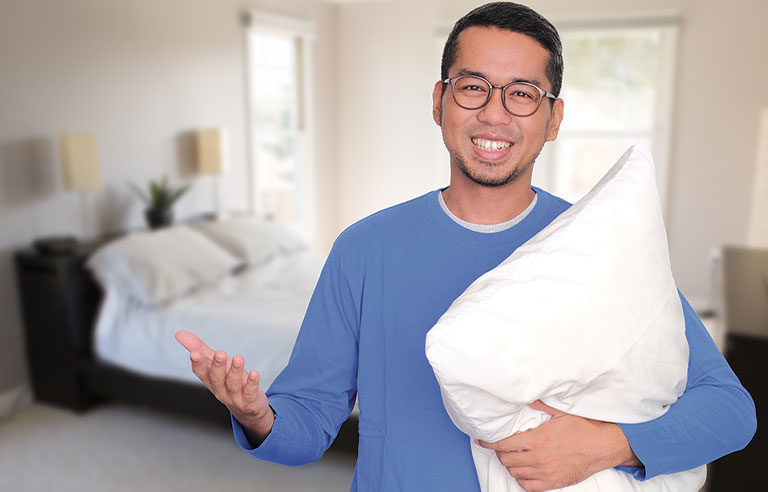5 tips for a good night’s sleep

Not getting enough sleep lately? You’re not alone.
Around 1 out of 3 adults get less than the recommended seven to eight hours, the Centers for Disease Control and Prevention says.
So, how can we all get better sleep? We asked David Kuhlmann, a physician and member of the American Academy of Sleep Medicine Foundation’s board of directors, for some tips.
1. Stick to a schedule
“Your body craves routine,” Kuhlmann said.
Try to go to sleep and wake up around the same time every day – including on weekends. Consistent mealtimes help, too. And eating your last meal of the day at least two to three hours before bedtime helps prevent digestion from keeping you awake.
“Your 24-hour circadian rhythm takes cues from the world around it,” Kuhlmann added. “Inconsistent routines not only make it harder to sleep at night but also may increase your risk for heart disease.”
Also great for sleep? A regular schedule of exercise – as long as it’s not too close to bedtime.
2. Avoid caffeine, nicotine and alcohol
Many of us turn to caffeine to get our morning started or boost our alertness during the afternoon. To make sure its stimulating effects don’t linger when it’s time for bed, Kuhlman recommends you have your last caffeine at lunchtime. He also suggests limiting your total intake to no more than three servings a day. A serving is 6-8 ounces of coffee or caffeinated tea, and 12 ounces of soda.
Smoking and drinking alcohol can affect your sleep, too. “The stimulating effects of nicotine and caffeine take hours to wear off,” the Mayo Clinic says. “And even though alcohol might make you feel sleepy at first, it can disrupt sleep later in the night.”
3. Put down your phone
Do you look at your cellphone before going to sleep? Not a good idea, Kuhlmann says. The blue light from our smartphones is the “worst spectrum of light for sleep,” and using a phone can stimulate your brain and shift its focus from falling asleep to staying awake. Try putting down the phone and other electronic devices at least an hour before you head to bed.
4. Create an ideal sleeping environment
A dark bedroom dark can help you get better sleep. Try blackout curtains or drapes – or even a simple, inexpensive sleep mask.
Temperature also plays a role in sleep quality. The National Sleep Foundation recommends keeping your room between 60° and 67° F. Too cold for you? That’s OK, Kuhlmann says. Do what’s comfortable, although he notes that “cooler temperatures may help to lower core body temperature during sleep. There’s also more oxygen by volume in colder air, which could help with breathing.”
If unwanted noise, such as busy city traffic or a family member watching TV in another room, gets in the way of your sleep, you can take steps. Solutions include wearing earplugs, using a white noise machine or running a fan.
5. Take time to wind down
“A big part of sleep hygiene is preparing your body for sleep,” Kuhlmann said. “You don’t just lay down and go to sleep. You have to put yourself in the right mindset.” Quiet, relaxing activities such as reading a book or deep breathing can help. Give them a try!
Post a comment to this article
Safety+Health welcomes comments that promote respectful dialogue. Please stay on topic. Comments that contain personal attacks, profanity or abusive language – or those aggressively promoting products or services – will be removed. We reserve the right to determine which comments violate our comment policy. (Anonymous comments are welcome; merely skip the “name” field in the comment box. An email address is required but will not be included with your comment.)
